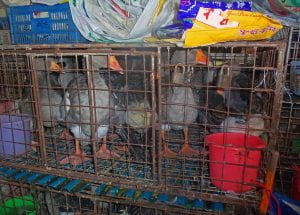You’ve probably heard it: Whatever the problem is—animal cruelty, climate change, pollution, biodiversity loss, or deforestation—veganism offers an answer. Today as we find almost every aspect of our lives disrupted by the COVID-19 pandemic, once again the annoying vegans can’t keep their mouths shut. Now, more than ever, is the time to ditch animal products — and, this time, for good.
Plant-based diets can save healthcare systems currently at the mercy of the spread of the pandemic.
As COVID-19 spreads rapidly worldwide, the phrase “flattening the curve” has taken the world. In practice, that means slowing down the spread of the virus so as not to overload local healthcare systems beyond their capacity to treat people. In other words, it’s about saving the healthcare system from collapsing when we need it the most.
While preventive measures such as social distancing, wearing cloth masks, and hand washing help “flatten the curve,” the current pandemic reveals a crisis to which our healthcare system has been vulnerable: the neglected epidemic of preventable yet costly chronic diseases.
Populations most susceptible to deaths due to COVID-19 and thus requiring in-patient care for treatment mainly include people who have other underlying medical conditions, such as cardiovascular disease, obesity, and diabetes. In the U.S. alone, the medical costs associated with cardiovascular disease, stroke, diabetes, and obesity add up to more than $1 trillion each year.
Why are the costs of preventable chronic diseases so high? A 2012 study exploring dietary factors and cardiometabolic deaths due to heart disease, stroke, or diabetes found that 45.4% of these deaths in the U.S. can be associated with poor dietary choices, including high consumption of processed meats. On the flipside, studies have shown plant-based diets are associated with lower risks of cardiovascular diseases and diabetes.
If the world’s population ate plant-based diets, there would be fewer people with chronic illnesses that make them more susceptible to the novel coronavirus, and health care facilities would be less burdened with patients—both those who have COVID-19 and those needing care for other chronic conditions.
Plant-based diets can help strengthen your immunity.
Having a strong immune system is always optimal. As you hunker down at home for an indefinite period of isolation, you might be wondering how to keep yourself healthy and your immune system strong. Evidence shows that eating a low-fat, plant-based diet rich in antioxidants and micronutrients can help strengthen immune defenses and reduce inflammation. As the nation braces for the challenges ahead, even a small decrease in your risk of getting sick can make a difference for your community. While changing your diet today may not lead to an improved immune system tomorrow, starting sooner rather than later will keep your body’s defense against viruses and bacteria strong for the long haul.
Looking into the future, we need to reduce chances of zoonoses—infectious diseases that spread from animals to humans—globally. Living on plant-based diets is an individual action everybody can take.
While the precise origin of the novel coronavirus causing COVID-19 remains unclear, analyses of the virus indicate that it was initially transmitted to humans from an animal source. Since many of the first cases were found in patients who had connections to a wet market in Wuhan, China, the Chinese government issued a ban on the trade and consumption of wildlife in late February.
The ban in China won’t be the end of the story, however. Globally, the rapid destruction of previously undisturbed ecosystems due to urbanization and farmland expansion has led to decreased distance between humans and wildlife and thus increased chances of zoonotic diseases. Indeed, human consumption of animals has been called a “‘cofactor’ in the genesis of new human diseases” by Gregory Gray, an infectious disease epidemiologist at Duke University. The expansion of industrial farming worldwide has pushed small-scale farmers to remote areas previously inhabited by wildlife, thus increasing the contact between humans and wildlife species such as bats and chimpanzees. If humans did not consume animals—both wildlife and farmed animals alike—there would be a much smaller risk of zoonotic transmission. The WHO recommends “reduc[ing] risk of transmission of emerging pathogens from animals to humans in live animal markets or animal product markets.”
Ducks in cages at a wet market in Shenzhen, China. Image source: Wikipedia Commons.
Wouldn’t such a goal be easier to achieve if consumption demand for animals and animal products did not exist at all? While the pandemic will be over someday, the impact of it is here to stay. Our current collective human condition compels us to realize the fragile state of our existence. As we reimagine the world and our place within it, we must not—and cannot—go back to business as usual. We have to fundamentally change the way we interact with animals. Unless we take actions to prevent pathogens from jumping from animals to us, the next pandemic will find us sooner than later.
Globally, that means bringing the international wildlife trade to a halt, conserving and protecting wildlife habitats, and stopping factory farming, agricultural intensification, and deforestation. For each individual, the most important action they can take is to stop consuming animals and animal products. Much like “flattening the curve” requires our collective action, the urgency to build a healthier world calls for everybody’s contribution. The starting point is entirely your behavior—not sometime in the future, but today.

